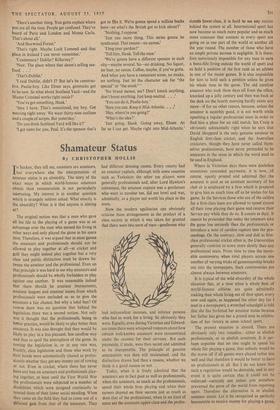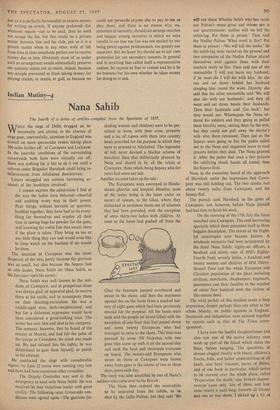Shamateur Status
By CHRISTOPHER HOLLIS IN hockey, they tell me, amateurs are amateurs, but everywhere else the interpretation of amateur status is an absurdity. The story of the exact ways in which world-famous amateurs obtain their remuneration is not particularly interesting. My interest is in another question which is strangely seldom asked. What exactly is the absurdity? What is it that anyone is aiming at?
The original notion was that a man who gave all his life to the playing of a game was at an advantage over the man who earned his living in other ways and only played the game in his spare time. Therefore, it was argued that in most games the amateurs and professionals should not be allowed to play together at all—at cricket and golf they might indeed play together but a very clear and public distinction must be drawn be- tween the amateur and the professional. Even on that principle it was hard to see why amateurs and professionals should be wholly forbidden to play against one another. It was reasonable indeed that there should be amateur tournaments, amateur leagues and amateur teams from which professionals were excluded so as to give the amateurs a fair chance, but why a total ban? Of course there was no question that behind the legislation there was a second notion. Not only was it thought that the professionals, being in better practice, would be likely to play better than amateurs. It was also thought that they would be likely to play in a less pleasant, less carefree way and thus to spoil the atmosphere of the game. In rowing the legislation is, or at any rate was, frankly, class legislation and those who work by their hands were automatically classed as profes- sionals whether they got any money out of rowing, or not. Even in cricket, where there has never been any ban on amateurs and professionals play- ing together, at least until the First World War the professionals were subjected to a number of disabilities which were designed continually to remind them of their lower social standing. When they came on the field they had to come out of a different gate from that of the amateurs. They had different dressing rooms. Every county had an amateur captain, although with some counties such as Yorkshire the other ten players were generally professionals and, after Lord Hawkes's retirement, the amateur captain was a gentleman who went in number ten, did not bowl and was, admittedly, as a player not worth his place in the team.
Now the modern egalitarian can obviously criticise these arrangements as the product of a class society in which it was taken for granted that there were two sorts of men—gentlemen who had independent incomes, and inferior persons who had to work for a living. So obviously they were. Equally, even during Victorian and Edward- ian times there were whispered rumours about how certain well-known amateurs were remunerated under the counter for their services. But such payments, if made, were then secret and admitted to be disreputable. The principle of genuine amateurism was then still maintained, and the distinction drawn had then a reason, whether we think it a good reason or not.
Today, when it is freely admitted that the amateurs are in fact paid as well as professionals, when the amateurs, as much as the professionals, spend their whole lives playing and when their careers depend on their success just as much as does that of the professional, when in no kind of sense are the amateurs upper-class and the profes- sionals lower-class, it is hard to see any reason behind the system at all. International sport has now become so much more popular and so much more common that contests in every sport are going on in one part of the world or another all the year round. The number of those who have an ample private income is negligible. It is there- fore notoriously impossible for any man to earn a bona-fide living outside the world of sport and to hold a position of the first rank as an athlete in one of the major games. It is also impossible for him to hold such a position unless he gives his whole time to the game. The old carefree amateur who took three days off from the office, knocked up a jolly century and then was back at the desk on the fourth morning hardly exists any more—if for no other reason, because, unless the amateur is superbly good, it is not worth while upsetting a regular professional team in order to find him a place for an odd match. Ian Craig is obviously substantially right when he says that David Sheppard is the only genuine amateur in English first-class cricket, and the Australian cricketers, though they have never called them- selves professionals, have never pretended to be amateurs in the sense in which the word used to be used in England.
Where in Victorian days there were doubtless sometimes concealed payments, it is now, of course, openly printed and admitted that the amateur is paid as an assistant secretary of his club or is employed by a firm which is prepared to give him as much time off as he wishes for his game. In the Services those who are of the calibre for a first-class team are allowed to spend almost all their time playing their game and receive their Service pay while they do so. It counts as duty. It cannot be pretended that today the amateurs take the game less seriously than the professionals or introduce a note of careless rapture into the pro- ceedings. On the contrary, slow and dull as first- class professional cricket often is, the Universities generally contrive to score more slowly than any professional team. From time to time the inevit- able controversy when rival players accuse one another of varying tricks of gamesmanship breaks out into the newspapers. Such controversies are almost always between amateurs.
It is typical of the wild absurdity of the whole situation that, at a time when a whole host of world-famous athletes arc quite admittedly making their whole living out of their sport, every now and again, as happened the other day (so I read in a newspaper), a wretched schoolgirl is told that she has forfeited her amateur status because her father has given her a pound note in celebra- tion of her victory in some school sport.
The present situation is absurd. There are obviously only two remedies : either to abolish professionals, or to abolish amateurs. It is per- haps arguable that no one ought to spend his whole life playing a game, that nobody would be the worse off if all games were played rather less well and that therefore it would be better to have no professionals at all. But I do not know that such a regulation would be desirable, and in any event it is quite certain that it could not be enforced—certainly not unless you somehow prevented the press of the world from reporting sport. Therefore the alternative is to abolish amateur status. Let it be recognised as perfectly honourable to receive money for playing a game, just as it is perfectly honourable to receive money for writing an article. If anyone preferred—for whatever reason—not to be paid, then he need not accept the fee, but that could be a private matter between him and his club, just as it is a private matter when in any other walk of life from time to time somebody prefers not to receive money due to him. Obviously most of us under such an arrangement would substantially preserve our amateur status not so, much, indeed, because any scruple prevented us from taking money for playing cricket, or tennis, or golf, as because we could not persuade anyone else to pay to see us play them, and there is no reason wIty we, amateurs of necessity, should not arrange matches and leagues among ourselves in which we were careful to see that our fun was not spoiled by our being pitted against professionals, too greatly our superiors. But we lesser fry should see to our own protection for our secondary contests. In general and in anything that called itself a representative contest, let anyone be free to contest and let it be no business but his own whether he takes money for doing so or not.































 Previous page
Previous page